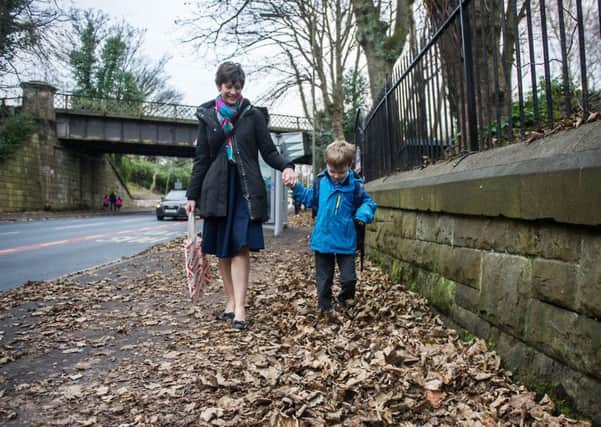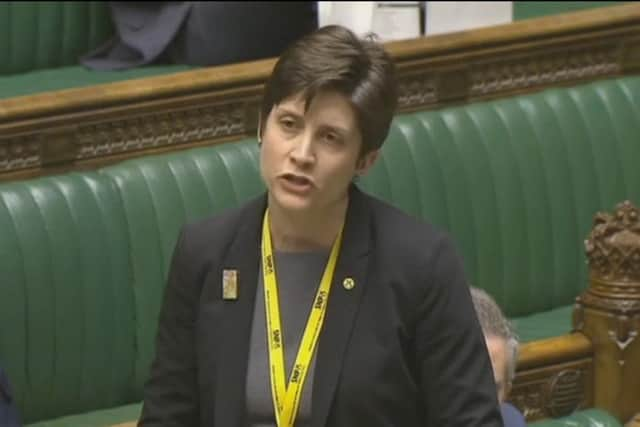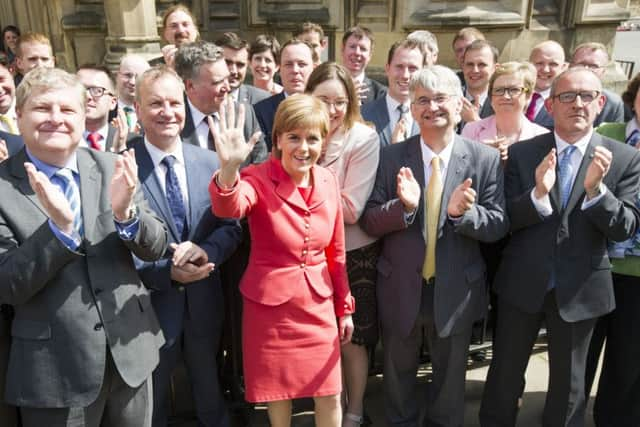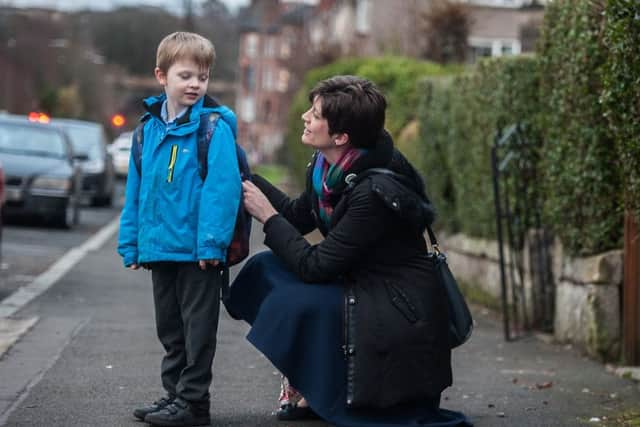Alison Thewliss on juggling politics, children and campaigning


On the stairs of a terraced house in the south of Glasgow sits three-year-old Kirsty Wright; she is munching a slice of toast and Nutella, much of which has been smeared across her face, as her brother Alexander, six, digs into a pile of footwear and pulls out his school shoes. It is 8.28am and the hall bristles with barely suppressed panic. But it’s 1 December, so before the children can be bundled out of the door, there is one more important job to do: the ceremonial opening of the Advent calendars. As if from nowhere, the calendars appear; the windows are located, the chocolates scoffed and it’s a wrap: the walk to nursery and school can begin.
Overseeing this military operation is the children’s mother: SNP MP Alison Thewliss. Thewliss is highly organised – her hair and her make-up done and the papers she needs for the rest of the day set aside to lift on her way out. But, as she watches Alexander kick contentedly through the leaves, she has that air of chronic fatigue familiar to working mothers everywhere; and no wonder.
Advertisement
Hide AdAdvertisement
Hide AdThanks to a late Commons vote, Thewliss only arrived back from London at 10pm the night before. And she has a packed day ahead. First, she is heading for a conference on domestic violence at Strathclyde University, then to her office to catch up with a backlog of constituency work. Tonight she is on school/nursery pick-up duty, and tomorrow morning she has to be on the first flight back to London to support Mhairi Black as she puts forward a private member’s bill to limit benefits sanctions. The demands of being a politician and a parent, mean she has a checklist constantly running through her head and a copy of Roald Dahl’s Matilda in her tote bag. “Alexander suggested I take it to London so I can read it to him on the nights I’m away,” she says.


Thewliss is one the of the 56 SNP MPs (20 of them women) who rode into Westminster on the SNP tsunami in May, 2015. When she decided to stand for Glasgow Central, she had no expectation of overturning Anas Sarwar’s 10,000-strong majority. It wasn’t until the ballot boxes started arriving at the count that it began to dawn on her that she might actually take the seat. Even so, when the returning officer read out the result – an SNP victory with a 7,000-plus majority – she was shell-shocked. At that point, she was still breastfeeding Kirsty.
Despite her lack of psychological preparedness, Thewliss has been quick to make her mark, especially on issues relating to women. Just a few months after she arrived in the House of Commons, she secured a debate on breastfeeding. And – although breastfeeding in the chamber is still prohibited – attitudes are slowly changing. In July, the Speaker John Bercow welcomed an independent review which suggested changing the rules to “showcase the Commons as a role model”.
It has been Thewliss’s campaigning on the “rape clause” – tucked away on P88 of the 2015 budget – however, that has earned her most respect. Reading the document from back to front, as her years as a councillor taught her, Thewliss noticed the controversial plan to restrict child tax credits to two children for new claimants from April 2017 included an exemption for women whose third child was the result of rape.
Could the government really be so ignorant of the complexities around gender-based violence that it would ask traumatised women to share their ordeals with officials from the Department for Work and Pensions? Would it include such a contentious proposal, without a detailed consideration of how such disclosures would be collated or assessed?


“I couldn’t believe it when I saw it,” says Thewliss. “I asked my colleague: ‘Does this mean what I think it means?’ That was last July, and the government has still not given any details of how it intends to implement it. Asking women to [prove they have been raped] is stigmatising and wrong. That’s why I have been pushing so hard.”
Thewliss has indeed been pushing hard. She raised the issue so many times, the government was forced to launch a consultation, the results of which will be announced in the New Year. Then – a few hours after we meet – she scores another victory of sorts when her nemesis, Lord Freud, the Minister for Welfare reform, announces he is stepping down. Thewliss previously described the meeting she had with the peer over the rape clause as “the most frustrating and soul-destroying” in her nine years of elected public office. Lord Freud’s suggestion that women should just “flee” abusive relationships seemed to reflect a wider lack of understanding within the party about coercive control within domestic relationships.
Though the consultation lasted just 38 days, Thewliss is optimistic a change of prime minister makes a U-turn on the rape clause possible. But she will not be happy until the two-child restriction on child tax credits policy has been reversed. “The Tories seem to think people will be on full tax credits from the start so they will be able to make an informed decision about whether or not they can afford a third child,” she says. “But they don’t take into account people’s changing circumstances. You might decide to have a third child when everything’s going well, but then your partner takes ill or dies, and you have to start claiming then. Nor do they take into account the fact that some ethnic minorities or religions have larger families. There’s a cultural dimension that’s not being acknowledged.”
Advertisement
Hide AdAdvertisement
Hide AdWhile some of the 2015 intake of SNP MPs owe their political awakening to the independence referendum, it was the 1997 devolution referendum that inspired 34-year-old Thewliss to join the party. Back then she was a pupil at Carluke High. Too young to vote herself, she carried out an exit poll at her former primary school as part of a modern studies project. Her parents, both social studies teachers, were politically engaged, though not – to her knowledge – politically aligned. But when speakers from a number of parties came to tout their wares, it was the SNP that caught Thewliss’s attention.


Later, studying politics and international relations at Aberdeen University, she got involved in canvassing, but a poor showing in the Holyrood elections in 2003 meant opportunities to work for the party were limited once she graduated. After an extended spell in Next and a three-month internship in Brussels, she was employed as a researcher for MSP Bruce McFee. McFee decided not to seek re-election in 2007, but, by then, the party was looking for candidates for the local elections, so Thewliss agreed to stand in Glasgow where the party had just three councillors out of 79.
Thewliss was one of the 19 SNP gains; at the age of just 24, she and a handful of other young pretenders found themselves in an environment dominated by crusty old men. If her feminism hadn’t been hard-wired, it would surely have been forged by her experiences at the City Chambers. She says she has expunged much of the sexism from her memory, but she recalls the day a councillor patted her female colleague’s stomach in the misguided belief she was pregnant. And she recently came across the note of apology another councillor was forced to write after responding to her heckle with the words: “Haw, hen, if I threw a stick would you go and fetch it?”
It says something about Thewliss’ personality that she just carried on regardless. When she gave birth to Alexander in 2010, she decided that, instead of taking six months leave, she would just bring him along with her. Three years later, she did the same with Kirsty.
“In some respects it was easy because at that age they’re quite portable,” she says. “I didn’t ask permission, I just did it and no-one said I couldn’t. I got odd looks sometimes when I breastfed in committee meetings, but no-one ever challenged me.”


Where some politicians guard their private lives like Rottweilers, Thewliss is refreshingly open about hers. As a councillor, she wrote a blog called Bellgrove Belle on which she posted pictures of her wedding to Joe, a software developer, and of her children, including one of Alexander asleep on her office desk. For decades, the fear of being perceived as less able has prevented working mothers from talking about the challenges they face. Thewliss’s willingness to confront them head-on then and to demonstrate how they might be overcome must have been a boon to the female councillors from other local authorities who sometimes phoned her for advice.
It was Thewliss’s belief in the importance of equal representation that drove her to stand as a MP. “I remember looking at the shortlist for Glasgow Central and thinking: ‘There’s not enough women there and I reckon I am at least as good as some of the men,’” she says. “I just thought: ‘I’ll test myself a wee bit and see how I get on.’ Also, you can’t keep complaining about there not being enough women in politics if you’re not prepared to step up.”
Having read Winnie Ewing’s autobiography, she appreciates how much tougher it would have been to head off to Westminster 40 years ago when women were more isolated. “I am thankful there’s always folk around that you can go for a cup of tea with or chat to about what kind of day you’ve had,” she says. She feels guilty about all the missed parents’ nights, but believes that, by keeping women’s issues on the agenda, she is performing a valuable role. Last month, she gained MPs’ unanimous backing to push ahead with a bill to tighten up legislation around the advertising of formula milk.
Advertisement
Hide AdAdvertisement
Hide AdAt the conference on violence against women, held as part of the awareness-raising 16 Days of Activism, Thewliss says there needs to be a shift from teaching girls how to keep themselves safe to teaching boys about consent. Almost exactly a week later, her former colleague, Michelle Thomson, will go on to tell the Commons how being raped at the age of 14 left her feeling “spoiled and impure” and caused her to “detach” from the child she had been. She will talk in chilling detail about the impact of the rape; about how she suffered low self-esteem until, eventually, she sought help and learned to see herself as a survivor not a victim.
The fact any MP feels able to share such a painful and emotional story in the chamber is testament to how much Westminster and the world has changed. But, Thewliss insists, there’s a long way to go. She points out that there still have been fewer female MPs in the entire history of the House of Commons (450 since Constance Markievicz in 1918) than there are male MPs in the Commons today (459). She talks too of the barracking women such as Tasmina Ahmed-Sheikh have to endure.
She is determined to be an agent of change. In particular, she would like to see the Commons become more family-friendly, with debates finishing earlier – à la Holyrood – and a crèche, not only for MPs, but for those who come to the Commons to give evidence. “Researchers have found people coming to give evidence are predominantly male, live near London and are of a particular background, which isn’t good [because you are hearing only those voices],” she says. “Parliament needs to look at this and say: “How inclusive are we actually being?”


After she has finished at Strathclyde University, Thewliss poses obligingly for some more photographs then walks to her constituency office near the Gallowgate. Along the way, she answers questions on other pressing issues: the Istanbul Convention on violence against women, which the UK has signed up to but not yet ratified, and the redrawing of constituency boundaries which, she says, will mean more work for MPs.
But she is clearly preoccupied by all the things she has to achieve within the next 24 hours: the nursery/school pick-up, the crack-of-dawn flight to London, the journey back in time for her afternoon surgery. She looks worn out. But she has promises to keep; and miles to go before she sleeps.